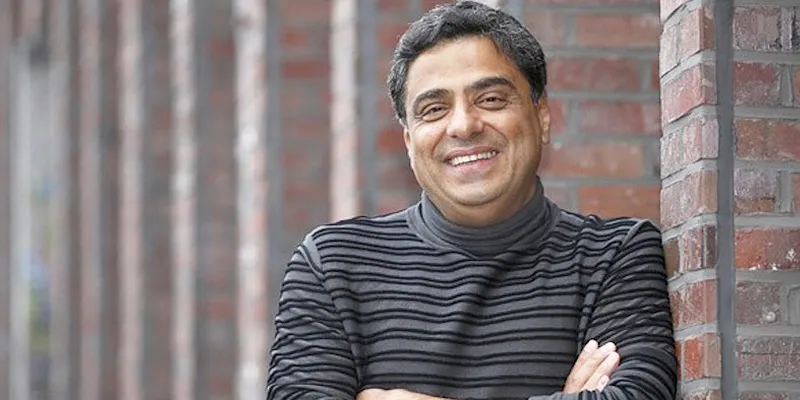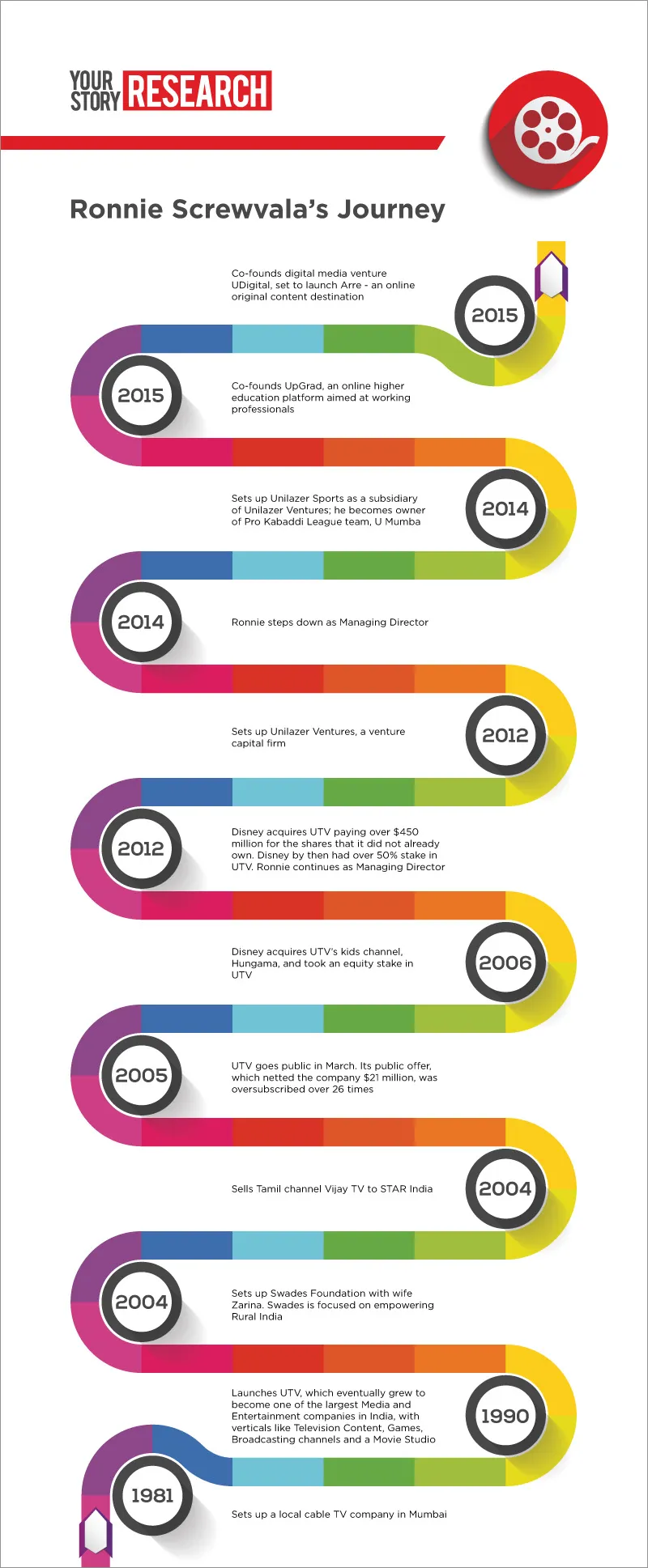Ronnie Screwvala – the man who doesn’t like to be labelled

Most people would like to take a break after exiting a company they had run for 24 years. But Ronnie Screwvala is not most people.
The founder of media conglomerate UTV, which he exited in 2014, Ronnie is now busier than ever – he is a startup Co-Founder, Investor, Pro Kabbadi League team owner and, along with wife Zarina, Founder of a philanthropic foundation. To top it all, this year, he also turned author, publishing his book Dream with Your Eyes Open: An Entrepreneurial Journey. He is doing this after building and exiting ventures like UTV, Vijay TV, and Hungama in an entrepreneurial journey that has spanned over three decades.
“I didn't move out of media and entertainment to take a break. I moved out of media and entertainment because it was the right strategy at that point,” says Ronnie. He adds that he was very clear that whatever he would do has to create greater impact. “That obviously means I would have to work that much harder because I was starting from scratch.” And Ronnie loves building things up from scratch.
Don’t give up
In the early 1980s, when entrepreneurship was not the cool buzzword that it is today and no one used the term ‘startup’, Ronnie decided to set up something on his own. Those were the days when only Doordarshan was around and the national channel also had just a few hours of programming. He set up a local cable TV network that started by providing services to a few homes in Mumbai. “It sounded like such a brilliant idea, but for a year there were no takers for it,” recalls Ronnie. “I got my grounding as an entrepreneur in that first year by knocking on more than thousand doors and making demonstrations.”
He says one of the most important lessons he learnt then was “believe in your idea.” This is highly relevant for entrepreneurs today. “When not even a single person wants to subscribe to your business, it can be highly crippling, highly demotivating,” says Ronnie, who was in his 20s then. But Ronnie stuck at it, bootstrapped and innovated to build the business. He started providing cable services to hotels to expand his customer base. He says he removed the option of shutting down from the whole equation.
“I think that makes a big difference. Today, a lot of people question their ideas if there are no results for three months or if they don’t get funding. Either you believe in your idea or you don't,” he says.
The experience of building up his cable TV venture gave him a good foundation for UTV. The media house, which has interests in television content, games, broadcasting channels and a movie studio, was bootstrapped for many years.

Don’t startup planning an exit
The successful scaling up of UTV is a well-documented journey. From creating content for other media houses to having multiple broadcasting channels and producing blockbuster movies like Jodhaa Akbar, A Wednesday, Delhi Belly, and No one Killed Jessica, UTV has come a long way. After its acquisition by Disney in 2012, Ronnie stayed on for about two years as Managing Director. Despite having many exits to his name, he says he has never planned an exit. “I think most people think you wake up one morning and say I have done this, now I want to exit. Never happens,” says Ronnie. “The more I thought (of Disney’s offer to buyout UTV) the more it made sense for the company, it made great sense for all the team members because they could go to the next level.”
This is one of the reasons why he does not like to be called serial entrepreneur. “To me serial means pre-mediated and that to me is flaw,” he says. Ronnie says an entrepreneur should never start a venture with an exit in mind. “An exit does not happen because of ‘strategy’. It wouldn't happen because you planned it. It happened because you got a product that you wanted; you had an open mind.”
Second innings
Ronnie set up his venture fund Unilazer around the time Disney acquired UTV as he wanted to stay involved with startups. However, he says, being just an investor was not in his DNA. Starting up again was the other option. This time around Ronnie has opted to be a co-founder, allowing him to focus on multiple interests.
His online education venture, UpGrad, focusses on higher education for working professionals and is offering a 15-week programme in entrepreneurship. His digital media venture, Arre, will produce original content in both fiction and non-fiction. He expects both to be nothing less than market leaders.
He has also set up Unilazer Sports, a sports-marketing firm focussed on kabbadi, football, and motorsports. Ronnie, through Unilazer Sports, owns pro-Kabbadi League team U Mumba, runs football training programme U Dream Football, and will launch the motorsports focussed U Moto 250 in 2016.
It was his many discussions with young entrepreneurs once he turned investor that led him to write a book. He realised that the stigma attached to entrepreneurship had not really changed since the 1980s. “People used to say Ronnie couldn’t land a job and that’s why he became an entrepreneur. That was not true. That attitude still prevails,” says Ronnie. He hopes the book and his talks with founders will result in more youngsters taking to entrepreneurship. “What are 10,000 entrepreneurs among 1.3 billion people? We need 10 million in the next five years to create an impact,” says Ronnie.
Mayank Kumar, one of the Co-Founders at UpGrad, says freshly minted entrepreneurs like him can learn a lot from Ronnie’s experience. Mayank says he learnt how to think of long-term scale, while solving immediate issues. “Another learning is the importance of building a brand. Also, the importance of ignoring the clutter and come to quick decision,” says Mayank, who was earlier Vice President at Bertelsmann India Investments.
As Ronnie gets comfortable in his new innings, what excites and motivates him? Ronnie says wanting to do something disruptive and impactful keeps him motivated. “I was blessed to take up a hobby and turn it into a profession, and today again I am blessed with the luxury of doing what I want to do and not what I have to do,” says Ronnie.
Ronnie’s top tips for founders
- Raising funding is not the goal; don’t benchmark yourself against your ability to raise investments.
- Stick to your idea, give it time, and think innovatively.
- Think big and think scale right from the start.
- Learn to bootstrap and to do more with less.
- Understand your customer well.
- Don’t plan for an exit when you are starting up. Build for yourself.







![[YS Exclusive] ‘Had to let a meaningful number of people go for the company’s growth’: Freshworks CEO Dennis Woodside](https://images.yourstory.com/cs/2/fe056c90507811eea8de27f99b086345/CopyofNewPPTTemplates62-1736395865849.jpg?mode=crop&crop=faces&ar=1%3A1&format=auto&w=1920&q=75)